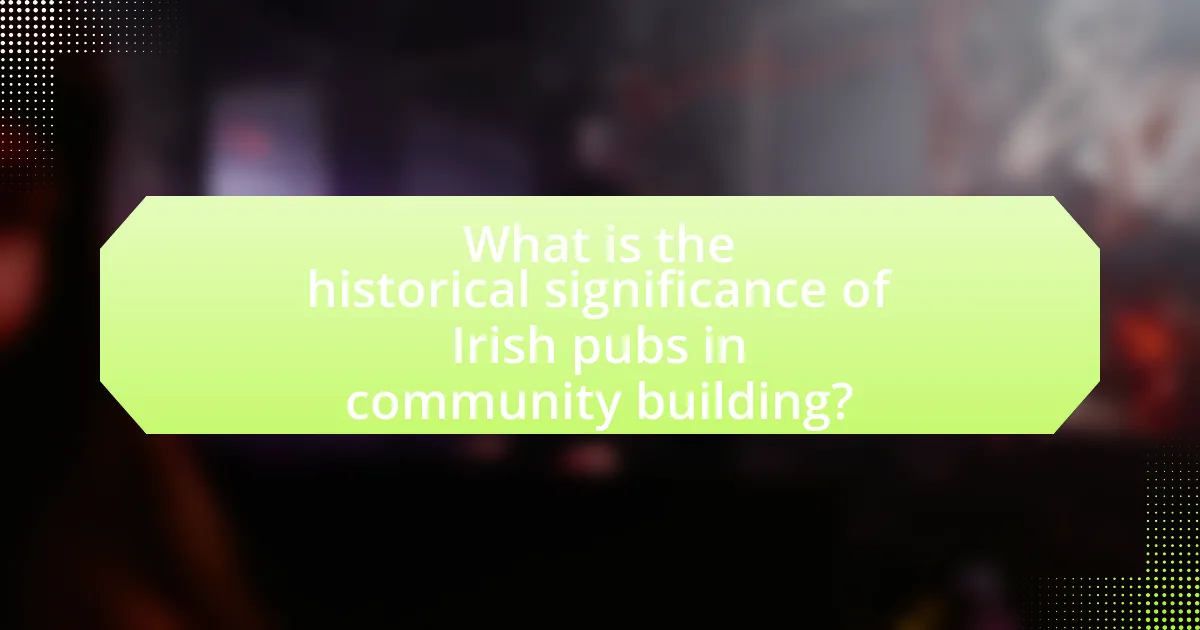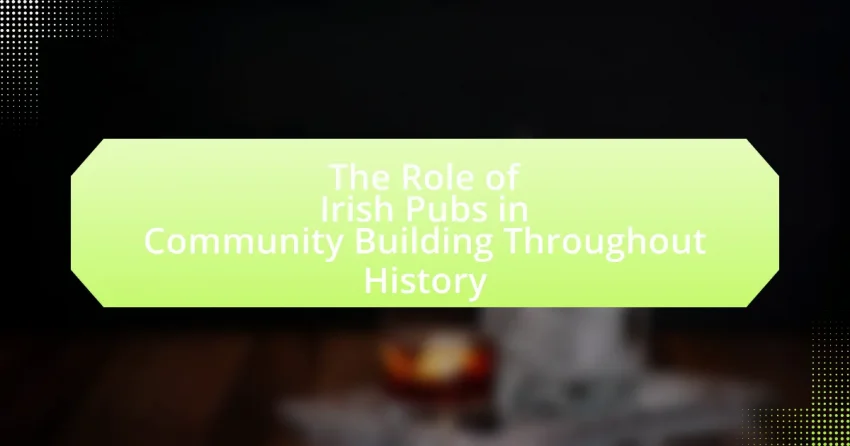The article examines the historical significance of Irish pubs as essential centers for community building. It outlines how these establishments have evolved from simple gathering places to vibrant social hubs that reflect contemporary culture while maintaining their cultural heritage. Key topics include the original purposes of Irish pubs, their roles during significant historical events, their contributions to cultural preservation, and the challenges they face in modern society. Additionally, the article discusses how Irish pubs foster social interactions, support local economies, and engage with community initiatives, highlighting their ongoing importance in promoting social cohesion and cultural identity.

What is the historical significance of Irish pubs in community building?
Irish pubs have historically served as vital centers for community building, acting as social hubs where individuals gather to share stories, celebrate events, and foster relationships. These establishments have played a crucial role in maintaining cultural identity, particularly during periods of social and political upheaval in Ireland, such as the Great Famine and the struggle for independence. Pubs provided a space for communal support and solidarity, allowing people to connect and organize around shared experiences and challenges. Furthermore, the tradition of storytelling and music in Irish pubs has helped preserve cultural heritage, reinforcing community bonds and collective memory.
How have Irish pubs evolved over time?
Irish pubs have evolved from simple gathering places in rural communities to vibrant social hubs that reflect contemporary culture. Historically, Irish pubs served as essential venues for social interaction, often doubling as shops or homes, particularly in the 18th and 19th centuries. The introduction of the Public House Act in 1902 regulated licensing, leading to a more standardized pub experience. In the late 20th century, the rise of globalization and tourism transformed Irish pubs into iconic establishments, often featuring traditional music and cuisine to attract visitors. Today, many Irish pubs incorporate modern design elements while maintaining their cultural heritage, thus continuing to play a crucial role in community building and social cohesion.
What were the original purposes of Irish pubs in local communities?
The original purposes of Irish pubs in local communities were to serve as social hubs for gathering, communication, and community bonding. Historically, these establishments provided a space for locals to meet, share news, and engage in discussions, fostering a sense of belonging and community identity. Irish pubs also functioned as venues for cultural activities, such as music and storytelling, which reinforced local traditions and social cohesion. The significance of these roles is evident in the long-standing tradition of pubs being central to community life in Ireland, where they have been integral to social interactions and cultural preservation.
How did the role of Irish pubs change during significant historical events?
The role of Irish pubs evolved significantly during historical events, transforming from mere drinking establishments to vital community hubs. During the Great Famine of the 1840s, pubs became places of refuge and support, where people gathered to share news, resources, and solace amidst widespread suffering. In the early 20th century, particularly during the struggle for Irish independence, pubs served as meeting points for activists and revolutionaries, facilitating discussions and planning for political action. Additionally, during the Troubles in Northern Ireland, pubs often acted as safe spaces for community solidarity, where individuals could express their identities and resist oppression. These transformations illustrate how Irish pubs adapted to the social and political climates of their times, reinforcing their importance in community building and cultural identity.
Why are Irish pubs considered cultural hubs?
Irish pubs are considered cultural hubs because they serve as communal gathering places that foster social interaction and cultural exchange. Historically, these establishments have been integral to Irish society, providing a space for storytelling, music, and traditional celebrations, which are essential aspects of Irish culture. For instance, the prevalence of live music sessions in pubs encourages local musicians to showcase their talents, thereby preserving and promoting Irish musical heritage. Additionally, pubs often host events that celebrate local festivals and holidays, further solidifying their role as centers of community life. This cultural significance is supported by studies indicating that pubs contribute to social cohesion and community identity, making them vital to the fabric of Irish society.
What cultural practices are commonly associated with Irish pubs?
Cultural practices commonly associated with Irish pubs include traditional music sessions, storytelling, and communal gatherings. These practices foster a sense of community and belonging, as Irish pubs often serve as social hubs where locals and visitors come together to share experiences. Live music, particularly traditional Irish folk music, is a staple in many pubs, enhancing the atmosphere and encouraging participation. Additionally, storytelling, whether through spoken word or song, plays a significant role in preserving cultural heritage and creating connections among patrons. The communal aspect is further emphasized by the layout of pubs, which typically encourages interaction among guests, reinforcing the pub’s role as a vital social space in Irish culture.
How do Irish pubs contribute to the preservation of Irish heritage?
Irish pubs contribute to the preservation of Irish heritage by serving as cultural hubs that promote traditional music, storytelling, and community gatherings. These establishments often host live music sessions featuring traditional Irish instruments, which helps to keep the musical heritage alive. Additionally, pubs frequently display Irish art and memorabilia, reinforcing cultural identity. According to a study by the Irish Pub Company, 80% of patrons believe that pubs play a vital role in maintaining Irish culture and traditions. This demonstrates that Irish pubs are not just places for socializing but are integral to the ongoing practice and celebration of Irish heritage.
What social functions do Irish pubs serve in communities?
Irish pubs serve as vital social hubs in communities, fostering social interaction, cultural identity, and community cohesion. They provide a space for people to gather, share stories, and build relationships, which is essential for social bonding. Historically, Irish pubs have been places where local events, music, and cultural celebrations occur, reinforcing community ties. Research indicates that these establishments contribute to social capital by promoting trust and cooperation among patrons, which is crucial for community resilience.
How do Irish pubs facilitate social interactions among community members?
Irish pubs facilitate social interactions among community members by providing a welcoming environment that encourages conversation and connection. The layout of Irish pubs, often featuring communal seating and a bar area, promotes mingling among patrons. Additionally, the presence of traditional music, events, and sports screenings creates shared experiences that foster camaraderie. Historical evidence shows that Irish pubs have long served as social hubs, where locals gather to discuss community matters, celebrate milestones, and support one another, reinforcing social bonds and community identity.
What role do Irish pubs play in supporting local economies?
Irish pubs play a significant role in supporting local economies by generating employment, attracting tourism, and fostering community engagement. These establishments create jobs not only within the pub itself but also in related sectors such as food suppliers, entertainment, and local artisans. For instance, a study by the Irish Pub Company found that each pub can support approximately 10 jobs directly and several more indirectly through local supply chains. Additionally, Irish pubs often serve as cultural hubs, drawing tourists who contribute to the local economy through spending on food, drinks, and entertainment. This influx of visitors can lead to increased revenue for surrounding businesses, further enhancing the economic impact of Irish pubs in their communities.

How do Irish pubs foster a sense of belonging?
Irish pubs foster a sense of belonging by serving as communal spaces where individuals can gather, socialize, and share experiences. These establishments often feature traditional music, storytelling, and local events that encourage interaction among patrons, creating a welcoming atmosphere. Historical evidence shows that Irish pubs have long been integral to community life, acting as hubs for social engagement and cultural exchange, particularly in rural areas where they serve as the primary venue for socializing. The consistent presence of familiar faces and the establishment of friendships within these spaces further enhance feelings of connection and belonging among community members.
What elements create a welcoming atmosphere in Irish pubs?
Elements that create a welcoming atmosphere in Irish pubs include warm lighting, friendly staff, traditional music, and communal seating arrangements. Warm lighting fosters a cozy environment, while friendly staff enhance the sense of hospitality, making patrons feel valued and at home. Traditional music, often played live, adds to the cultural experience and encourages social interaction. Communal seating arrangements promote conversation and connection among guests, reinforcing the pub’s role as a social hub. These elements collectively contribute to the inviting ambiance that characterizes Irish pubs, making them integral to community building.
How does the design and layout of Irish pubs enhance community engagement?
The design and layout of Irish pubs enhance community engagement by fostering social interaction through open spaces and communal seating arrangements. These features encourage patrons to gather, converse, and build relationships, which is essential for community bonding. For instance, the traditional long bar counter allows for easy communication between customers and bartenders, creating a welcoming atmosphere. Additionally, the presence of cozy nooks and shared tables promotes a sense of belonging, making it easier for individuals to connect with others. Historical evidence shows that Irish pubs have served as vital social hubs, where local events and gatherings take place, further solidifying their role in community engagement.
What role does music and entertainment play in building community ties?
Music and entertainment play a crucial role in building community ties by fostering social interaction and creating shared experiences among individuals. In Irish pubs, live music sessions and entertainment events encourage patrons to gather, engage in conversation, and form connections, thereby strengthening community bonds. Research indicates that communal activities, such as music performances, enhance social cohesion by providing a platform for cultural expression and collective enjoyment, which is essential for community identity. For instance, a study published in the Journal of Community Psychology highlights that participation in community music events significantly increases feelings of belonging and social support among attendees.
How do Irish pubs support community initiatives?
Irish pubs support community initiatives by serving as venues for local events, fundraisers, and social gatherings that foster community engagement. These establishments often host charity events, live music, and cultural celebrations, which not only raise funds for local causes but also strengthen social ties among residents. For instance, many Irish pubs collaborate with local charities to organize events that benefit schools, health services, and community projects, thereby directly contributing to the welfare of the community. Additionally, research indicates that pubs play a vital role in preserving local culture and traditions, further enhancing their significance as community hubs.
What types of events are commonly hosted in Irish pubs to benefit the community?
Irish pubs commonly host events such as charity fundraisers, live music nights, quiz competitions, and community gatherings to benefit the community. These events foster social interaction and raise funds for local causes, such as health initiatives or educational programs. For instance, many Irish pubs organize charity nights where a portion of the proceeds goes to local charities, demonstrating their commitment to community support. Additionally, live music events often feature local artists, promoting cultural engagement and providing a platform for community talent.
How do Irish pubs collaborate with local organizations and charities?
Irish pubs collaborate with local organizations and charities by hosting fundraising events, providing venues for community gatherings, and donating a portion of their profits to support local causes. These establishments often partner with charities to organize events such as quiz nights, live music performances, and themed parties, which not only raise funds but also foster community spirit. For instance, many Irish pubs participate in initiatives like “Pints for Prostates,” where a percentage of sales during specific events goes directly to prostate cancer research. This collaboration strengthens community ties and enhances the social fabric, demonstrating the integral role of Irish pubs in local philanthropy and support.

What challenges do Irish pubs face in modern society?
Irish pubs face significant challenges in modern society, including competition from alternative social venues, changing consumer preferences, and regulatory pressures. The rise of craft breweries, cocktail bars, and home entertainment options has intensified competition, leading to a decline in traditional pub patronage. Additionally, younger generations are increasingly favoring experiences over alcohol consumption, which affects foot traffic in pubs. Regulatory pressures, such as stricter licensing laws and health regulations, further complicate operations and profitability. According to a 2021 report by the Vintners’ Federation of Ireland, over 1,000 pubs have closed in Ireland since 2005, highlighting the impact of these challenges on the traditional pub landscape.
How has globalization impacted the traditional Irish pub experience?
Globalization has significantly transformed the traditional Irish pub experience by introducing diverse cultural influences and altering customer demographics. As international travel and communication have increased, Irish pubs now attract a global clientele, leading to a fusion of local and international drinking customs. This shift has resulted in the incorporation of various food and beverage offerings, such as craft beers from different countries and international cuisine, which were not traditionally part of the Irish pub experience. Additionally, the rise of social media and digital marketing has changed how pubs engage with patrons, promoting events and creating a more vibrant atmosphere that appeals to a broader audience. These changes reflect a departure from the classic, localized pub culture, as globalization encourages a more eclectic and commercially driven environment.
What are the effects of changing consumer preferences on Irish pubs?
Changing consumer preferences significantly impact Irish pubs by altering their offerings and operational strategies. As consumers increasingly favor craft beers, cocktails, and unique dining experiences over traditional pub fare, many Irish pubs have adapted their menus to include a wider variety of beverages and food options. For instance, a report by the Drinks Industry Group of Ireland noted a 20% increase in craft beer sales from 2015 to 2019, indicating a shift in consumer tastes. Additionally, the rise of health-conscious choices has led some pubs to introduce low-alcohol and non-alcoholic beverages, catering to a broader audience. This evolution not only affects the types of products offered but also influences the overall atmosphere and social dynamics within these establishments, as they strive to remain relevant in a competitive market.
How do Irish pubs adapt to remain relevant in contemporary culture?
Irish pubs adapt to remain relevant in contemporary culture by incorporating modern amenities, hosting diverse events, and embracing digital engagement. These establishments have upgraded their interiors to provide a more comfortable and stylish atmosphere, appealing to younger patrons while retaining traditional elements. Additionally, many Irish pubs now offer live music, quiz nights, and themed events that cater to a wide range of interests, fostering community interaction. The integration of social media and online platforms allows these pubs to connect with customers, promote events, and enhance their visibility, ensuring they remain a central part of social life. This adaptability is crucial, as studies show that pubs that engage with their communities and evolve with changing social trends are more likely to thrive in the competitive hospitality market.
What strategies can Irish pubs implement to strengthen community ties?
Irish pubs can strengthen community ties by hosting regular events that encourage local participation, such as quiz nights, live music, and cultural celebrations. These activities foster social interaction and create a sense of belonging among patrons. For instance, a study by the Irish Pub Association found that pubs that engage in community events see a 30% increase in customer loyalty and foot traffic. Additionally, collaborating with local charities for fundraising events can enhance community support and visibility, reinforcing the pub’s role as a community hub.
How can Irish pubs enhance their role as community centers?
Irish pubs can enhance their role as community centers by hosting local events, providing a space for social interaction, and supporting local culture. By organizing activities such as live music, trivia nights, and community fundraisers, these establishments foster a sense of belonging and engagement among residents. Research indicates that pubs that actively participate in community events see increased patronage and stronger local ties, as they become venues for shared experiences and cultural expression. For instance, a study by the University of Limerick found that pubs that host community gatherings significantly contribute to local social cohesion and economic vitality.
What best practices can Irish pubs adopt to engage with younger generations?
Irish pubs can engage with younger generations by incorporating modern technology, offering diverse entertainment options, and creating a vibrant social atmosphere. Utilizing social media platforms for marketing and event promotion allows pubs to reach younger audiences effectively, as 90% of millennials use social media regularly. Additionally, hosting live music, trivia nights, and themed events can attract younger patrons looking for unique experiences. Furthermore, providing a variety of craft beers and innovative cocktails caters to the evolving tastes of younger consumers, who increasingly prefer artisanal and locally sourced products. These practices not only enhance the pub experience but also foster community engagement, aligning with the historical role of Irish pubs as social hubs.
